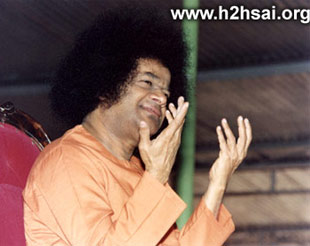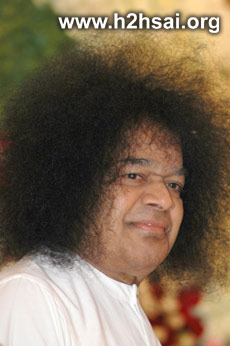CONVERSATIONS WITH SAI
Satyopanishad - part 19:
Direct Directions from the Divine
Dear Reader,
In response to your positive feedback to this section where we have a conversation with the Divine, we continue with Prof. Anil Kumar’s ‘Satyopanishad’ following Dr. John Hislop’s series ‘Conversations with Bhagavan Sri Sathya Sai Baba’ that ended in January 2008.
This series is also in the question-answer format that many devotees prefer, and has answers from Bhagavan on topics as wide ranging as the origin of evil, the goals of human life, and aspects of God – embodied and formless, to price hikes, women’s liberation, vegetarianism, and the generation gap among people of the present times.
Published in two parts by the author, these volumes have 270 questions in all, which are neatly grouped under separate chapters. In this issue, we continue the sixth chapter, ‘Parallels and Polarities’.
Chapter 6: Parallels and Polarities
(Continued from the previous issue)
Prof. Anil Kumar: Out of the two, faith and love, which precedes the other? Is it true that we love if only we have faith, or is it the other way round? Kindly tell us about it.
 |
Bhagavan: You should definitely have faith first in order to love. Do not doubt this. Unless you have full faith that so and so is your father, mother, son, wife or husband, you will not be able to love any one of them. If you have no faith, and if you are not sure of the dear ones how can you love them? Is it possible for you to love the one you doubt? So, faith comes first and love next.
Prof. Anil Kumar: Swami! We meet many persons who say that they can believe only after going through an intimation of divinity; that is they can develop faith only after they experience. But, many also feel that only strong faith gives us that experience. So, which of the two precedes the other? Please tell us, Swami.
Bhagavan: Faith, which comes first, gives you experience. You must have unwavering faith in order to experience. Faith is the foundation. For example, to swim, you should jump into water. You cannot say that you will jump into water only after learning swimming.
You cannot learn it on tar roads or cement roads. You can learn it only in water. Here water is faith and the art of swimming is experience. So, faith precedes experience.
|
Prof. Anil Kumar: Swami! Is it proper to say that 'I am in God'? Or should I say that 'God is in me'? Which of the two is appropriate?
 |
Bhagavan: Our scripture says, sarvam vishnu mayam jagat, God is all pervasive. He encompasses the entire Universe. Vasudevas sarvamiti, isavasyam idam sarvam are our scriptural dicta. They make it very clear that the entire cosmos is in Him.
It is correct to say that you are in God. It is not correct to say that God is in you. Of course, when the whole universe is in Him, naturally you are in Him. How? A small example: You are holding in your hand a rose flower. It means that the rose flower is small and you are big. Since God is infinite, the world is in Him. But, if you put it in the reverse order by saying that God is in you, you become bigger than God. This is not a proper feeling. You are a spark of that divine. mamaivamso jivaloke jivabhutah sanatanah, says the Gita.
Prof. Anil Kumar: Swami! How is it possible not to be attached to the family and to rise above the feeling of 'mine' and 'thine'?
Bhagavan: A small example here. A rich man who resides in a big bungalow has an Alsatian dog. This dog is always vigilant and will not permit anyone to enter the house. Now what can be done to get into that house? You are left with two ways. Either you should tame the dog and get in or call for the rich man to escort you. Otherwise, the dog will not permit you to move forward even an inch.
Similarly, to pass through the main gate of attachment, you have to tame possessiveness, like a dog. This is karma marga, the path of action. Alternatively, you can call for the help of God and get in. This is bhakti marga, the path of devotion. Hence, karma, selfless action and bhakti, devotion, are the two alternatives for developing detachment and giving up possessive instincts.
 |
Prof. Anil Kumar: Swami! We come across certain terms used in philosophy and get very much confused. For instance, 'conscience' and 'consciousness'. Are they not synonyms? If not, what is the difference between the two? Scholars, when consulted, add to the confusion. I am at a loss to know what these two terms 'conscience’ and ‘consciousness' mean.
Bhagavan: There is difference between the two. They are not definitely synonyms. You should know here three terms: 'subconscious’, ‘conscience’, and ‘consciousness'. That which works below the senses is the subconscious. But, 'conscience' is above the senses. 'Consciousness' is all pervasive.
A small example: You have air all around. You fill a balloon with air. It gets inflated. Now, there is air in the balloon and also outside it. If you pump in more air into the balloon it bursts with the result that the air in the balloon gets merged with the air around. You can equate the air within the balloon with subconscious and the air all around with conscience.
The divinity within the individual is conscience while divinity in everyone, which is all pervasive, collective, and universal is consciousness. Spirituality refers to many subtle things. You must understand them very carefully.
Prof. Anil Kumar: Swami! Almost all of us claim to have immense faith in and intense love for Bhagavan. But, we also notice at the same time a lot of ego and pride in our words and deeds. What is to be done then?
Bhagavan: It is impossible for an egotistic person to know and experience God. This is very certain. Just as water flows always downwards, so also a proud man is sure to fall. You may say that you love God. But, God also must acknowledge your love. Should He not? Suppose you send a registered letter to your friend, should you not get the acknowledgement? Similarly, God also should be touched and moved by your devotion to Him in order to respond to your love. This will never happen so long as there is ego in you.
 |
One day Krishna and Arjuna noticed a Brahmin who was holding a sword and eating a dry blade of grass. They were very surprised to see such a peculiar Brahmin. Slowly, they approached him and softly asked him why he was carrying a sword as he was a Brahmin. The Brahmin said, "I am in search of four persons, whom I have decided to kill". Krishna asked, “Who are they?" In reply, the Brahmin said, “The first person I want to kill is Narada, the celestial singer. He sings continuously the glory of Narayana all the time and everywhere he moves making Narayana, my God, restless. So, I must kill him.
“The second person I am going to kill is that boy Prahlada. His father put him to suffering of all kinds. My Lord had to rush every time to save him. When Prahlada was given poison, my Lord had to be there in the poison to save him. When he was thrown from the mountaintop, my God had to stretch His hands to hold and save him. When he was thrown into the sea, my Lord had to rescue him.
When he was thrown into the fire, my Lord had to be there too in the fire to save him. He was trampled under the feet of an elephant and Narayana had to be there for his protection. Every time he prayed to God, He, out of compassion, responded to his prayers. In a way, Prahlada made my God constantly wait to save him so that nothing untoward might happen to him at any time. So I plan to kill him.
|
“The third person in my hit list is Draupadi. She prayed to my Lord Krishna as the only refuge of the forlorn when she was being disrobed in the open court by Dussasana. My God Krishna had to rush to help her out of a most humiliating situation leaving all His consorts behind Him and without saying anything to anyone. And last but not the least, the person whom I want to kill is Arjuna, He made my Lord his charioteer during the Kurukshetra war and gave Him a great deal of trouble.”
Arjuna standing by the side of Krishna heard the entire conversation. He bent his head in full recognition of the Brahmin's devotion to God, a kind of devotion which excelled even his own.
Prof. Anil Kumar: Swami! How can we differentiate thought from intuition?
 |
Bhagavan: Thought is the outcome of the mind, and hence it is dual while intuition is non-dual. A thought may arise according to your convenience. But, intuition is beyond both mind and intellect; it is the direct perception of truth and hence it stands for conviction. So, intuition is said to be buddhi which is transcendental, buddhi grahyamati indriyam.
A thought may be right or wrong, but the prompting of an intuition is nothing but truth. Thoughts are mostly of a sensual and worldly nature. But, intuition is the inner voice or the voice of conscience and is divine. Your intelligence may sometimes lead you to a situation when you begin to doubt or suspect even your wife. Sometimes you may also turn mad. But, conscience or intuition awakens your inner awareness.
Prof. Anil Kumar: Swami! We are influenced by social, ethical, scientific, economic and political factors in life. I have one question to ask You. If I am wrong, kindly pardon me. We hear people speaking about equality and equanimity. How can we achieve them? Some groups in society claim to work towards these ideals. How are we to accomplish them?
Bhagavan: There is nothing wrong if one is a seeker of truth. You understand clearly that the two words you now mentioned samanatva equality, and samatva equanimity, are not synonymous. They have different meanings.
Samatva, equanimity, is to be achieved at the individual level, while samanatva, equality, applies to a society. Equanimity has to be achieved by everyone. It is the state of mind unruffled by 'bumps and jumps' in life, not tossed about by defeats and failures. A state of mind that remains the same in the time of both fortune and misfortune is said to be equanimous.
Samatva, equanimity, is to be achieved at the individual level, while samanatva, equality, applies to a society. It is impossible to realise and establish samatva anywhere and at any time. Your body is not equal to it. It has ups and downs. While your nose and stomach project outwards, your neck dips downwards. Are you like a pillar? Then, how about the earth? Is it level? No. It is full of ups and downs with mountains, valleys, hills, oceans, etc. Isn't it? Are all of you of the same height, weight and complexion? Are your ideas, aspirations, ambitions equal? No. Where is equality then?
A small illustration: One person has seven acres of land. Another person has five acres. Supposing you divide the land equally between them, the first person loses one acre and naturally feels sad, while the other person gains one more acre and feels happy. The feelings of the two are not the same. Then, where is equality?
 |
A small story to illustrate the same meaning: A certain king went round his kingdom in disguise and noticed the sufferings and difficulties of some of his people. He decided to alleviate their sufferings. He went to a forest and there he prayed to God. God manifested before him and granted him the life span of a hundred years to realise his dream of establishing equality in his kingdom, when all people would be happy and equal.
On hearing this, the queen went and prayed to God. "Oh God! May the people also be granted a hundred year span of life! What is the use if only the king lives for a hundred years?" God granted a hundred years to each one of the people also.
Then a few elders did penance and pleased God who responded to their prayers by granting a hundred years to the queen, Rajyalakshmi. After some time the king returned to his kingdom, and with great difficulty, he could find out his palace because God had made all equal and hence he noticed palaces all over.
The king asked the queen, “Why the streets are dirty?" She said, “Oh! We have no sweepers now, all being equal”. Then the king asked the queen to get some water ready for him to take his bath. The queen said, “Oh King! We have no servants as all are equal now”. The king realised his mistake, as he found the entire social order greatly disturbed. He immediately prayed to God for the return of the old order.
This is how the so-called equality operates. But, equanimity is different. It has to be achieved by everyone. It is the state of mind unruffled by 'bumps and jumps' in life, not tossed about by defeats and failures. A state of mind that remains the same in the time of both fortune and misfortune is said to be equanimous.
You should not be elated by praise or depressed by blame but maintain equanimity in both times. Spiritually, ekovasi sarvabhutantaratma, the same God is in everyone. Feelings of thirst and hunger are identical for all. Desires differ, views vary. As you know, 'tastes differ'. Equality is impossible but equanimity is desirable and one has to work for it.
Prof. Anil Kumar: Swami! Excuse me for putting this question. We speak of 'God' and 'demigod'. Are both the same? Please clarify.
There are two types of telephone calls. One is the number call and the other the personal call. When I dial your number to find out if you are at home, anyone at home can respond. But, if I make a 'personal call' only you will reply. Similarly, all prayers to demigods are like 'number calls'. But, a prayer to God is the 'personal call.'
 |
Bhagavan: I often say, 'You are God'. In the ancient days our population was much less, say about three crores. So people said there were three crores of demigods or devatas. Remember that the human body is the moving temple of God. But, it should be realised in your experience. This you don't get out of worldly or secular knowledge. You don't get it in the realm of your mind with sugyana. But, it is experienced through atmagyana, knowledge of the Self. If God is the Prime Minister, demigods, devatas are Cabinet Ministers, each one of them being in charge of a particular department, like Finance, Education, Home, etc.
During earlier times, they considered the five elements demigods, such as agnideva, Fire God, vayudeva, Wind God, bhumata, Mother Earth, varunadeva, Rain God, Lakshmi, Goddess of Wealth, Sarasvati, Goddess of knowledge, Durga, Goddess of Energy, and so on. If you write a letter addressed to the Prime Minister, it will go to him, so also your prayers to God. But, if you write to the Cabinet Ministers separately, the letters go to them respectively. Our yajnas and yagas are the sacred rituals that appease demigods.
Another example: There are two types of telephone calls. One is the number call and the other the personal call. When I dial your number to find out if you are at home, anyone at home can respond. But, if I make a 'personal call' only you will reply. Similarly, all prayers to demigods are like 'number calls'. But, a prayer to God is the 'personal call.'
During namasankirtan, congregational singing, all can sing mentioning various names, attributes and qualities of God. However, in meditation you have to concentrate on a name and form of your choice.
(To be continued...)
Dear Reader, did this article inspire you in any way? Would you like more of such conversations with the Divine? Please share with us your reflections by writing to h2h@radiosai.org mentioning your name and country. Thank you for your time.





